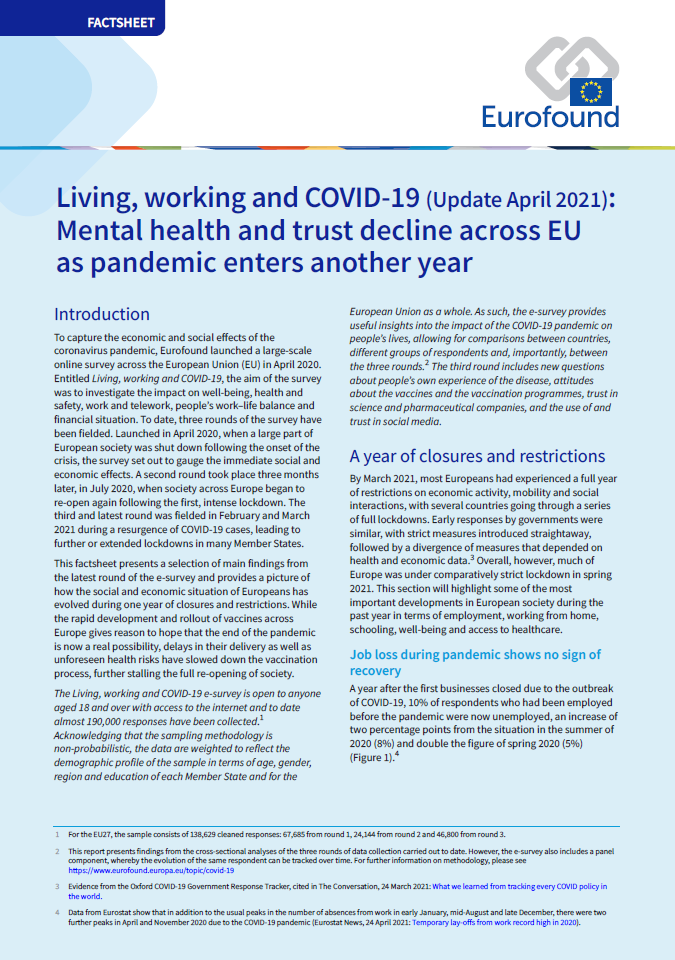
Tretie kolo elektronického prieskumu nadácie Eurofound, ktoré sa uskutočnilo vo februári a v marci 2021, sa venuje sociálnej a ekonomickej situácii ľudí v celej Európe po takmer celom roku života s obmedzeniami súvisiacimi s pandémiou COVID-19. V tejto správe sa analyzujú hlavné zistenia a opisuje sa prebiehajúci vývoj a trendy vo všetkých 27 členských štátoch EÚ od začiatku vykonávania prieskumu v apríli 2020. Poukazuje sa v nej na problémy, ktoré sa objavili počas pandémie, ako je zvýšená neistota zamestnania v dôsledku hrozby straty pracovného miesta, pokles úrovne duševnej pohody, narušenie nedávnych zlepšení v oblasti rodovej rovnosti, pokles úrovne dôvery v inštitúcie, zhoršenie rovnováhy medzi pracovným a súkromným životom a nárast váhavosti v očkovaní. Výsledky prieskumu poukazujú na potrebu holistického prístupu na podporu všetkých skupín ťažko zasiahnutých krízou, aby sa zabránilo ich ďalšiemu zaostávaniu.
Key findings
Od vypuknutia pandémie pred viac ako rokom dosiahla duševná pohoda vo všetkých vekových skupinách najnižšiu úroveň. Najväčší pokles bol zaznamenaný medzi mladými ľuďmi a tými, ktorí prišli o prácu.
Existujúce nerovnosti sa prehlbujú z dôvodu neprimeraného vplyvu pandémie na zraniteľné skupiny. Zo zistení vyplýva, že ťažkosti s vystačením si s príjmom sa výrazne zväčšili najmä v prípade tých, ktorí sa už nachádzali v zložitej situácii.
Spokojnosť občanov s podpornými krízovými opatreniami výrazne klesla, pričom v súčasnosti má už len 12 % respondentov pocit, že podporné opatrenia sú spravodlivé, čo predstavuje pokles z 22 % v lete 2020. Pomer tých, ktorý majú pocit, že získanie podpory je jednoduché a efektívne, sa takisto znížil, a to zo 16 % v lete 2020 na 10 % na jar 2021. Takmer každý desiaty respondent uviedol, že jeho žiadosť o finančnú podporu bola zamietnutá.
Dôvera v inštitúcie sa prudko znížila, najmä dôvera v národné vlády, ktorá klesla zo 4,6 % v lete 2020 na 3,9 % na jar 2021. Dôvera v národné vlády vo všetkých členských štátoch klesla pod úroveň zaznamenanú na začiatku pandémie. Rovnako klesla aj dôvera v EÚ, ale je stále vyššia ako dôvera v národné vlády.
Viac ako štvrtina ľudí žijúcich v Európe uvádza váhavosť voči očkovacej látke proti COVID-19, pričom sa ukazuje, že muži sú váhavejší (29 %) ako ženy (25 %). Váhavosť v očkovaní je takisto úzko spojená s nízkou úrovňou dôvery a využívaním sociálnych médií, pričom krajiny, ktoré zaznamenávajú nízku úroveň dôvery vo vládu, zaznamenávajú vyššie úrovne váhavosti v očkovaní.
Explore the dataset for each round of the survey.
The data cover a range of topics under seven main headings: quality of life, democracy and trust, work and teleworking, the financial situation and security of respondents, the quality of public services, the employment support measures put in place, as well as the willingness of Europeans to be vaccinated during COVID-19.
- Data: Quality of life during COVID-19
- Data: Democracy and trust during COVID-19 (new in round 3)
- Data: Working during COVID-19
- Data: Financial situation and security during COVID-19
- Data: Quality of public services during COVID-19
- Data: Support measures during COVID-19 (new in round 3)
- Data: Vaccinations during COVID-19 (new in round 3)
The report contains the following lists of tables and figures. The corresponding data for the tables and figures is available as an Excel download (328KB .xlsx).
List of tables
- Table 1: Location of work and average hours worked during the pandemic, EU27 (%)
- Table 2: Proportion of parents declaring they are too tired after work to do household jobs, EU27 (%)
- Table 3: Proportion of respondents reporting having negative feelings by age and gender, EU27 (%)
- Table 4: Request for support by employment status, EU27 (%)
- Table 5: Proportion of financially fragile respondents by employment status, EU27 (%)
- Table 6: Proportion of respondents reporting difficulties making ends meet by employment status, EU27 (%)
- Table 7: Proportion of respondents reporting arrears by group, EU27 (%)
- Table 8: Trust in the EU by sociodemographic group (mean scores), EU27 (%)
- Table 9: Trust in the national government and the EU by financial support (mean scores), EU27 (%)
List of figures
- Figure 1: Respondents who lost their job (of those who were employed before the pandemic) by country, EU27 (%)
- Figure 2: Preference to work from home post-pandemic, EU27 (%)
- Figure 3: Proportion of parents declaring they would like more online schooling for their children, even when the pandemic is over, EU27 (%)
- Figure 4: Risk of depression by age group and survey round, EU27 (%)
- Figure 5: Unmet need for healthcare during the pandemic by country, EU27 (%)
- Figure 6: Unmet need for healthcare by type of healthcare, spring 2021, EU27 (%)
- Figure 7: Requests for different types of support measures, summer 2020 and spring 2021, EU27 (%)
- Figure 8: Views about pandemic support measures, summer 2020 and spring 2021, EU27 (%)
- Figure 9: Views about pandemic support measures by country, spring 2021, EU27 (%)
- Figure 10: Proportion of respondents reporting difficulties making ends meet by country, EU27 (%)
- Figure 11: Pessimism about financial situation by economic situation, EU27 (%)
- Figure 12: Proportion of respondents stating that their financial situation will get worse, EU27 (%)
- Figure 13: Trust in institutions (mean scores), EU27 (%)
- Figure 14: Trust in the EU by country (mean scores), EU27 (%)
- Figure 15: Trust in national governments by country and survey round, EU27 (%)
- Figure 16: Stated intention to take vaccine by country, EU27 (%)
- Figure 17: Sociodemographic characteristics of people with vaccine hesitancy in Europe, EU27 (%)
- Figure 18: Reasons for vaccine hesitancy, EU27 (%)
- Figure 19: Trust in institutions among people who are vaccine hesitant and non-hesitant, EU27 (%)
- Figure 20: Vaccination hesitancy before and after 11 March 2021, EU27 (%)
- Infographic: Living, working and COVID-19
